高中英文 7000 單字表全攻略 (附完整PDF下載、App推薦與高效記憶法)
你是否曾經為了背誦英文單字 7000 而感到焦慮不安,明明花費大量時間卻總是記了又忘?PREPEDU.COM 專為高中生打造這份終極英文 7000 單字學習指南,讓詞彙掌握不再是夢想。
高中英文單字 7000 是台灣教育體系的重要基石,也是大學入學考試的關鍵要素。然而,多數學生採用傳統死記硬背的方法,不僅效率低下,更容易產生學習倦怠。真正有效的詞彙學習需要系統化策略、科學記憶法以及實際應用練習的完美結合。當你掌握正確方法後,這7000個單字將從學習負擔轉變為語言能力的堅實基礎,為未來的英語溝通、學術研究和職業發展奠定不可撼動的根基。
本文將提供完整的英文單字 7000 下載資源、推薦高效記憶策略,並分享頂尖考生都在使用的學習技巧,讓你從零開始建構紮實的英語詞彙庫,實現從應試到應用的完美蛻變。讓我們一起踏上這段英語詞彙精進之旅吧!

I. 7000 常用英文單字大全
建立完整的英文單字 7000 資源庫是成功學習的第一步,我們為您精心整理了多種格式的高品質字表。這些資源經過教學專家審核優化,比網路上零散的資料更完整實用,每種格式都標明適用對象,幫助您快速選擇最適合的學習工具。
1. 字彙 7000 (A - B)
|
英文單字 7000 |
意思 |
例句 |
|
abandon /əˈbændən/ (v.) |
放棄、拋棄 |
They had to abandon their car in the flood. (他們不得不在洪水中棄車而逃。) |
|
ability /əˈbɪləti/ (n.) |
能力、才能 |
Her ability to speak three languages impressed everyone. (她說三種語言的能力令所有人印象深刻。) |
|
absolute /ˈæbsəluːt/ (adj.) |
絕對的、完全的 |
The king had absolute power over his subjects. (國王對臣民擁有絕對權力。) |
|
absorb /əbˈzɔːrb/ (v.) |
吸收、理解 |
Plants absorb carbon dioxide from the atmosphere. (植物從大氣中吸收二氧化碳。) |
|
abstract /ˈæbstrækt/ (adj.) |
抽象的、理論的 |
Philosophy deals with many abstract concepts. (哲學處理許多抽象概念。) |
|
academic /ækəˈdemɪk/ (adj.) |
學術的、理論的 |
She received an academic scholarship to university. (她獲得了大學學術獎學金。) |
|
accept /əkˈsept/ (v.) |
接受、承認 |
I accept your apology and forgive you. (我接受你的道歉並原諒你。) |
|
access /ˈækses/ (n./v.) |
進入、接近 |
Students have free access to the library. (學生可以免費使用圖書館。) |
|
account /əˈkaʊnt/ (n./v.) |
帳戶、說明 |
Please transfer the money to my bank account. (請將錢轉到我的銀行帳戶。) |
|
accurate /ˈækjərət/ (adj.) |
準確的、精確的 |
The weather forecast was surprisingly accurate. (天氣預報出人意料地準確。) |
|
achieve /əˈtʃiːv/ (v.) |
達成、實現 |
Hard work helped him achieve his goals. (努力工作幫助他達成目標。) |
|
acquire /əˈkwaɪər/ (v.) |
獲得、學會 |
Children acquire language naturally through exposure. (兒童通過接觸自然地習得語言。) |
|
actual /ˈæktʃuəl/ (adj.) |
實際的、真實的 |
The actual cost was higher than estimated. (實際成本比估計的要高。) |
|
adapt /əˈdæpt/ (v.) |
適應、改編 |
Animals must adapt to survive in changing environments. (動物必須適應才能在變化的環境中生存。) |
|
adequate /ˈædɪkwət/ (adj.) |
足夠的、適當的 |
The hotel provided adequate but not luxurious accommodation. (旅館提供了足夠但不豪華的住宿。) |
|
administration /ədˌmɪnɪˈstreɪʃn/ (n.) |
管理、行政 |
The new administration promised to reduce taxes. (新政府承諾減稅。) |
|
admit /ədˈmɪt/ (v.) |
承認、允許進入 |
The university will admit 500 new students this year. (大學今年將錄取500名新生。) |
|
adopt /əˈdɒpt/ (v.) |
採用、收養 |
The company decided to adopt a new marketing strategy. (公司決定採用新的營銷策略。) |
|
adult /ˈædʌlt/ (n./adj.) |
成人、成年的 |
Only adults are allowed to enter this area. (只有成年人才能進入這個區域。) |
|
advance /ədˈvæns/ (v./n.) |
前進、進步 |
Technology continues to advance at a rapid pace. (技術繼續快速發展。) |
|
back /bæk/ (n./adv./v.) |
背部、返回、支持 |
Please sit back and relax during the flight. (飛行期間請坐好並放鬆。) |
|
background /ˈbækɡraʊnd/ (n.) |
背景、出身 |
His background in engineering helped him solve the problem. (他的工程背景幫助他解決了問題。) |
|
backward /ˈbækwərd/ (adj./adv.) |
向後的、落後的 |
The car rolled backward down the hill. (汽車向後滾下山坡。) |
|
bacteria /bækˈtɪriə/ (n.) |
細菌 |
Washing hands removes harmful bacteria. (洗手可以去除有害細菌。) |
|
bad /bæd/ (adj.) |
壞的、糟糕的 |
Smoking is bad for your health. (吸煙對健康有害。) |
|
badly /ˈbædli/ (adv.) |
嚴重地、糟糕地 |
The team played badly in the championship game. (球隊在冠軍賽中表現糟糕。) |
|
bag /bæɡ/ (n.) |
袋子、包 |
She carried her books in a large bag. (她用一個大袋子裝書。) |
|
baggage /ˈbæɡɪdʒ/ (n.) |
行李 |
Passengers must check their baggage before boarding. (乘客登機前必須檢查行李。) |
|
bake /beɪk/ (v.) |
烘烤、烘焙 |
She likes to bake cookies for her children. (她喜歡為孩子們烘焙餅乾。) |
|
balance /ˈbæləns/ (n./v.) |
平衡、餘額 |
It's important to balance work and family life. (平衡工作和家庭生活很重要。) |
|
ball /bɔːl/ (n.) |
球、舞會 |
The children played with a colorful ball in the park. (孩子們在公園裡玩彩色球。) |
|
ban /bæn/ (v./n.) |
禁止、禁令 |
The city will ban smoking in all public places. (該市將禁止在所有公共場所吸煙。) |
|
band /bænd/ (n.) |
樂隊、帶子 |
The rock band performed at the music festival. (搖滾樂隊在音樂節上演出。) |
|
bank /bæŋk/ (n.) |
銀行、河岸 |
She deposited her paycheck at the bank. (她在銀行存了薪水。) |
|
bar /bɑːr/ (n.) |
酒吧、條狀物 |
They met at the bar after work for drinks. (他們下班後在酒吧喝酒。) |
|
bare /ber/ (adj.) |
裸露的、基本的 |
The room was bare except for a single chair. (房間裡除了一把椅子外什麼都沒有。) |
|
barely /ˈberli/ (adv.) |
僅僅、幾乎不 |
She barely had enough money to buy lunch. (她幾乎沒有足夠的錢買午餐。) |
|
bargain /ˈbɑːrɡən/ (n./v.) |
便宜貨、討價還價 |
The antique was a real bargain at that price. (那個古董以那個價格真是便宜貨。) |
|
bark /bɑːrk/ (n./v.) |
樹皮、吠叫 |
The dog began to bark when strangers approached. (當陌生人靠近時狗開始吠叫。) |
|
barrier /ˈbæriər/ (n.) |
障礙、屏障 |
Language can be a barrier to communication. (語言可能是溝通的障礙。) |
|
base /beɪs/ (n./v.) |
基礎、建立在 |
Success is often based on hard work and dedication. (成功通常建立在努力工作和奉獻的基礎上。) |
|
basic /ˈbeɪsɪk/ (adj.) |
基本的、基礎的 |
Learning basic grammar is essential for language study. (學習基本語法對語言學習至關重要。) |
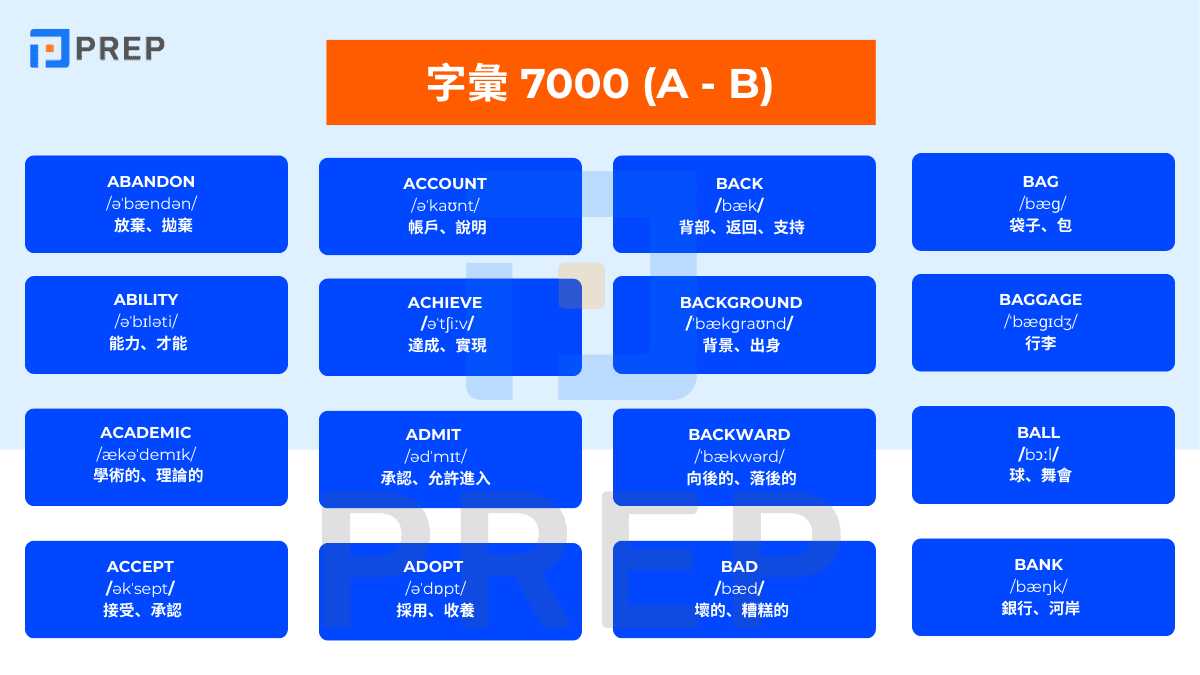
參考更多相關文章:
2. 字彙 7000 (C - D)
|
英文單字 7000 |
意思 |
例句 |
|
cable /ˈkeɪbl/ (n.) |
電纜、纜線 |
The internet cable was damaged in the storm. (網路電纜在暴風雨中受損。) |
|
cake /keɪk/ (n.) |
蛋糕、糕點 |
She baked a chocolate cake for the birthday party. (她為生日派對烤了巧克力蛋糕。) |
|
calculate /ˈkælkjuleɪt/ (v.) |
計算、估算 |
Students must calculate the area of the triangle. (學生們必須計算三角形的面積。) |
|
call /kɔːl/ (v./n.) |
呼叫、電話 |
Please call me when you arrive safely. (當你安全到達時請打電話給我。) |
|
calm /kɑːm/ (adj./v.) |
冷靜的、平靜 |
The calm sea reflected the sunset beautifully. (平靜的海面美麗地反射著夕陽。) |
|
camera /ˈkæmərə/ (n.) |
照相機、攝影機 |
The wildlife photographer used a professional camera. (野生動物攝影師使用專業照相機。) |
|
camp /kæmp/ (n./v.) |
營地、露營 |
Children love to camp in the forest during summer. (孩子們喜歡在夏天到森林裡露營。) |
|
campaign /kæmˈpeɪn/ (n./v.) |
活動、競選 |
The environmental campaign raised awareness about pollution. (環保活動提高了對污染的認識。) |
|
campus /ˈkæmpəs/ (n.) |
校園 |
The university campus has beautiful gardens. (大學校園有美麗的花園。) |
|
can /kæn/ (modal v./n.) |
能夠、罐頭 |
You can achieve anything with hard work. (通過努力工作你可以實現任何事情。) |
|
cancel /ˈkænsəl/ (v.) |
取消、撤銷 |
They had to cancel the outdoor concert due to rain. (由於下雨他們不得不取消戶外音樂會。) |
|
cancer /ˈkænsər/ (n.) |
癌症 |
Early detection improves cancer treatment success. (早期發現提高癌症治療成功率。) |
|
candidate /ˈkændɪdət/ (n.) |
候選人、應徵者 |
The candidate impressed everyone during the interview. (候選人在面試中給每個人留下了深刻印象。) |
|
capable /ˈkeɪpəbl/ (adj.) |
有能力的、能幹的 |
She is capable of handling difficult situations. (她能夠處理困難的情況。) |
|
capacity /kəˈpæsəti/ (n.) |
容量、能力 |
The stadium has a capacity of 50,000 spectators. (體育場可容納50,000名觀眾。) |
|
capital /ˈkæpɪtl/ (n./adj.) |
首都、資本 |
Paris is the capital city of France. (巴黎是法國的首都。) |
|
captain /ˈkæptən/ (n.) |
船長、隊長 |
The ship's captain navigated through the storm. (船長在暴風雨中航行。) |
|
capture /ˈkæptʃər/ (v./n.) |
捕獲、抓住 |
The photographer managed to capture the perfect moment. (攝影師成功捕捉到完美的瞬間。) |
|
car /kɑːr/ (n.) |
汽車、車廂 |
The electric car is environmentally friendly. (電動汽車對環境友好。) |
|
card /kɑːrd/ (n.) |
卡片、紙牌 |
She sent a birthday card to her grandmother. (她寄了一張生日賀卡給祖母。) |
|
care /ker/ (v./n.) |
關心、照顧 |
Parents care deeply about their children's happiness. (父母深深關心孩子們的幸福。) |
|
career /kəˈrɪr/ (n.) |
事業、職業生涯 |
She built a successful career in medicine. (她在醫學領域建立了成功的職業生涯。) |
|
careful /ˈkerfəl/ (adj.) |
小心的、仔細的 |
Be careful when crossing the busy street. (過繁忙街道時要小心。) |
|
carry /ˈkæri/ (v.) |
攜帶、運載 |
Strong workers carry heavy boxes easily. (強壯的工人輕鬆搬運重箱子。) |
|
damage /ˈdæmɪdʒ/ (n./v.) |
損害、破壞 |
The storm caused significant damage to crops. (暴風雨對農作物造成重大損害。) |
|
dance /dæns/ (v./n.) |
跳舞、舞蹈 |
Children love to dance to lively music. (孩子們喜歡隨著活潑的音樂跳舞。) |
|
danger /ˈdeɪndʒər/ (n.) |
危險、威脅 |
Swimming alone can pose serious danger. (獨自游泳可能帶來嚴重危險。) |
|
dangerous /ˈdeɪndʒərəs/ (adj.) |
危險的、有害的 |
Dangerous chemicals require special handling. (危險化學品需要特殊處理。) |
|
dare /der/ (v./n.) |
敢、挑戰 |
Few people dare to climb that mountain. (很少有人敢爬那座山。) |
|
dark /dɑːrk/ (adj./n.) |
黑暗的、暗色 |
The dark room needed more lighting. (黑暗的房間需要更多照明。) |
|
date /deɪt/ (n./v.) |
日期、約會 |
Please write today's date on your paper. (請在你的紙上寫上今天的日期。) |
|
daughter /ˈdɔːtər/ (n.) |
女兒 |
Their daughter graduated from university. (他們的女兒大學畢業了。) |
|
deal /diːl/ (v./n.) |
處理、交易 |
Let's deal with this problem immediately. (讓我們立即處理這個問題。) |
|
dear /dɪr/ (adj./n.) |
親愛的、昂貴的 |
Her dear friend visited from abroad. (她親愛的朋友從國外來訪。) |
|
debate /dɪˈbeɪt/ (n./v.) |
辯論、爭論 |
Students debate important social issues. (學生辯論重要的社會問題。) |
|
decade /ˈdekeɪd/ (n.) |
十年 |
Technology advanced rapidly in the past decade. (在過去十年中技術迅速發展。) |
|
decision /dɪˈsɪʒn/ (n.) |
決定、決策 |
Making important decisions requires careful thought. (做重要決定需要仔細思考。) |
|
declare /dɪˈkler/ (v.) |
宣布、聲明 |
The president will declare a national holiday. (總統將宣布國定假日。) |
|
deep /diːp/ (adj./adv.) |
深的、深深地 |
The deep ocean contains mysterious creatures. (深海中有神秘的生物。) |
|
degree /dɪˈɡriː/ (n.) |
學位、度數 |
She earned a master's degree in education. (她獲得了教育學碩士學位。) |
|
deliver /dɪˈlɪvər/ (v.) |
遞送、發表 |
Mail carriers deliver packages daily. (郵遞員每天遞送包裹。) |
|
department /dɪˈpɑːrtmənt/ (n.) |
部門、科系 |
The marketing department increased sales. (營銷部門增加了銷售額。) |
|
depend /dɪˈpend/ (v.) |
依靠、取決於 |
Children depend on parents for support. (孩子依靠父母的支持。) |
|
describe /dɪˈskraɪb/ (v.) |
描述、形容 |
Please describe your travel experience. (請描述你的旅行經驗。) |
|
design /dɪˈzaɪn/ (v./n.) |
設計、圖案 |
Architects design beautiful buildings. (建築師設計美麗的建築。) |
|
desk /desk/ (n.) |
書桌、辦公桌 |
Students organize supplies on their desk. (學生在書桌上整理用品。) |
|
develop /dɪˈveləp/ (v.) |
發展、開發 |
Companies develop new technologies constantly. (公司不斷開發新技術。) |
|
dictionary /ˈdɪkʃəneri/ (n.) |
字典、詞典 |
Students use dictionaries to learn vocabulary. (學生使用字典學習詞彙。) |
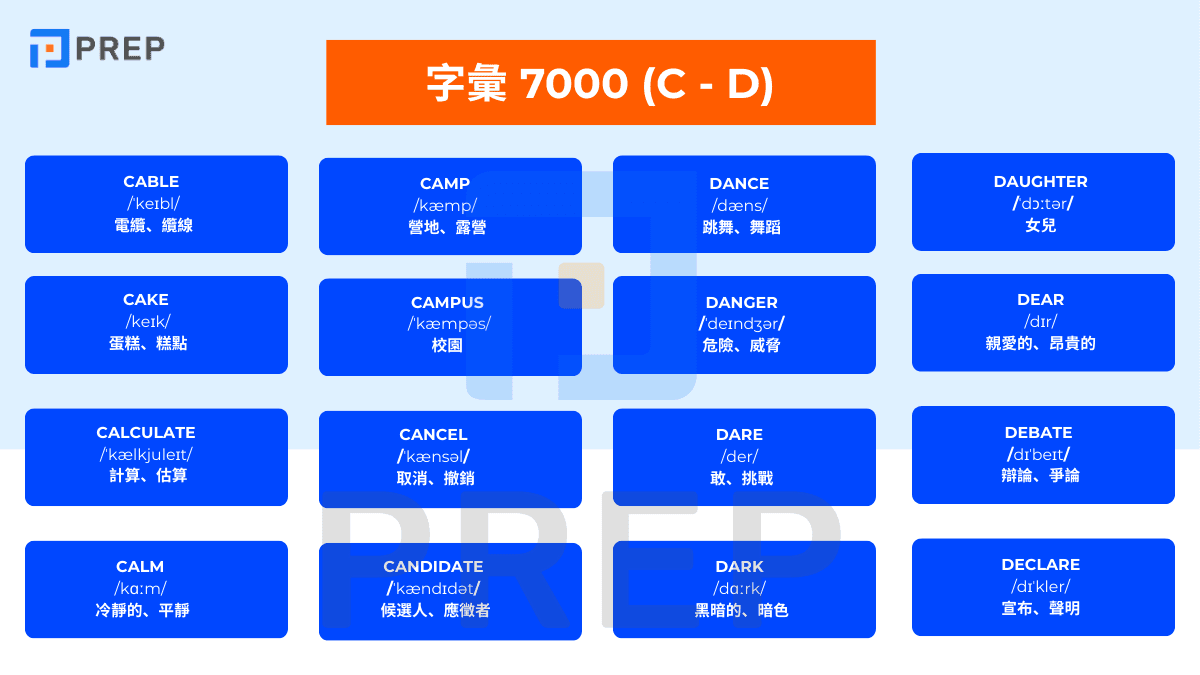
參考更多相關文章:
3. 字彙 7000 (E - F)
|
英文單字 7000 |
意思 |
例句 |
|
each /iːtʃ/ (det./pron.) |
每個、各自 |
Each student must complete the assignment individually. (每個學生都必須單獨完成作業。) |
|
eager /ˈiːɡər/ (adj.) |
渴望的、熱切的 |
Young children are eager to learn new skills. (小孩子渴望學習新技能。) |
|
ear /ɪr/ (n.) |
耳朵、聽覺 |
Loud music can damage your ear permanently. (大聲音樂可能永久損害你的耳朵。) |
|
early /ˈɜːrli/ (adj./adv.) |
早的、提早 |
Early morning exercise energizes the body. (清晨運動為身體注入活力。) |
|
earn /ɜːrn/ (v.) |
賺取、獲得 |
Hard work helps earn success and respect. (努力工作有助於獲得成功和尊重。) |
|
earth /ɜːrθ/ (n.) |
地球、土地 |
Protecting Earth is everyone's responsibility. (保護地球是每個人的責任。) |
|
earthquake /ˈɜːrθkweɪk/ (n.) |
地震 |
The powerful earthquake shook buildings violently. (強烈地震劇烈搖晃建築物。) |
|
ease /iːz/ (n./v.) |
容易、減輕 |
Technology should ease daily life tasks. (科技應該減輕日常生活任務。) |
|
east /iːst/ (n./adj.) |
東方、東邊的 |
The sun rises in the east every morning. (太陽每天早上從東方升起。) |
|
eastern /ˈiːstərn/ (adj.) |
東方的、東部的 |
Eastern philosophy emphasizes inner peace. (東方哲學強調內心平靜。) |
|
easy /ˈiːzi/ (adj.) |
容易的、簡單的 |
This math problem is surprisingly easy. (這道數學題出人意料地簡單。) |
|
eat /iːt/ (v.) |
吃、進食 |
Athletes eat nutritious foods for energy. (運動員吃營養食物獲取能量。) |
|
economic /ˌiːkəˈnɑːmɪk/ (adj.) |
經濟的、經濟學的 |
Economic growth benefits entire nations. (經濟增長造福整個國家。) |
|
economy /ɪˈkɑːnəmi/ (n.) |
經濟、經濟體 |
Technology drives modern economy forward. (科技推動現代經濟向前發展。) |
|
edge /edʒ/ (n.) |
邊緣、優勢 |
Sharp knives have a dangerous edge. (鋒利的刀有危險的刀刃。) |
|
education /ˌedʒuˈkeɪʃn/ (n.) |
教育、教養 |
Quality education opens doors to opportunities. (優質教育為機會打開大門。) |
|
effect /ɪˈfekt/ (n.) |
效果、影響 |
Exercise has positive effects on health. (運動對健康有積極影響。) |
|
effective /ɪˈfektɪv/ (adj.) |
有效的、起作用的 |
Effective communication prevents misunderstandings. (有效溝通防止誤解。) |
|
effort /ˈefərt/ (n.) |
努力、嘗試 |
Success requires consistent effort and patience. (成功需要持續的努力和耐心。) |
|
egg /eɡ/ (n.) |
雞蛋、卵 |
Fresh eggs provide excellent protein. (新鮮雞蛋提供優質蛋白質。) |
|
eight /eɪt/ (num.) |
八、八個 |
The meeting starts at eight o'clock sharp. (會議八點整開始。) |
|
eighteen /ˌeɪˈtiːn/ (num.) |
十八 |
She learned to drive at eighteen years old. (她十八歲學會開車。) |
|
eighty /ˈeɪti/ (num.) |
八十 |
His grandfather lived to eighty years old. (他的祖父活到八十歲。) |
|
either /ˈiːðər/ (det./conj.) |
任一、或者 |
You can choose either option for lunch. (你可以選擇任一午餐選項。) |
|
election /ɪˈlekʃn/ (n.) |
選舉、選擇 |
Democratic elections ensure fair representation. (民主選舉確保公平代表。) |
|
face /feɪs/ (n./v.) |
臉、面對 |
She smiled when they faced each other. (當他們面對面時她笑了。) |
|
fact /fækt/ (n.) |
事實、真相 |
Scientists base theories on proven facts. (科學家基於已證實的事實建立理論。) |
|
factor /ˈfæktər/ (n.) |
因素、要素 |
Weather is an important factor in agriculture. (天氣是農業的重要因素。) |
|
factory /ˈfæktəri/ (n.) |
工廠、製造廠 |
The factory produces automobiles efficiently. (工廠高效生產汽車。) |
|
fail /feɪl/ (v.) |
失敗、不及格 |
Students who don't study may fail exams. (不學習的學生可能會考試不及格。) |
|
failure /ˈfeɪljər/ (n.) |
失敗、故障 |
Failure often leads to eventual success. (失敗往往導致最終成功。) |
|
fair /fer/ (adj./n.) |
公平的、集市 |
Everyone deserves fair treatment under law. (每個人都應在法律下得到公平對待。) |
|
faith /feɪθ/ (n.) |
信仰、信心 |
She kept faith despite many challenges. (儘管面臨許多挑戰她仍保持信心。) |
|
fall /fɔːl/ (v./n.) |
跌倒、秋天 |
Leaves fall from trees in autumn. (秋天樹葉從樹上掉落。) |
|
false /fɔːls/ (adj.) |
假的、錯誤的 |
False information spreads quickly online. (虛假信息在網上傳播很快。) |
|
familiar /fəˈmɪljər/ (adj.) |
熟悉的、常見的 |
The song sounded familiar to everyone. (這首歌對每個人來說都很熟悉。) |
|
family /ˈfæməli/ (n.) |
家庭、家族 |
Strong families support each other. (強大的家庭互相支持。) |
|
famous /ˈfeɪməs/ (adj.) |
著名的、出名的 |
Famous artists inspire future generations. (著名藝術家啟發後代。) |
|
fan /fæn/ (n./v.) |
風扇、粉絲 |
The electric fan cooled the room. (電風扇讓房間涼爽。) |
|
far /fɑːr/ (adj./adv.) |
遠的、遠地 |
The mountains look far in the distance. (山脈在遠處看起來很遠。) |
|
farm /fɑːrm/ (n./v.) |
農場、務農 |
Organic farms grow healthy vegetables. (有機農場種植健康蔬菜。) |
|
farmer /ˈfɑːrmər/ (n.) |
農民、農夫 |
The farmer harvested wheat in summer. (農民在夏天收穫小麥。) |
|
fashion /ˈfæʃn/ (n.) |
時尚、方式 |
Paris influences global fashion trends. (巴黎影響全球時尚趨勢。) |
|
fast /fæst/ (adj./adv.) |
快的、快速地 |
Fast internet connections improve productivity. (快速網路連接提高生產力。) |
|
fat /fæt/ (adj./n.) |
胖的、脂肪 |
Healthy diets limit saturated fat intake. (健康飲食限制飽和脂肪攝入。) |
|
father /ˈfɑːðər/ (n.) |
父親、爸爸 |
Her father taught her to ride bicycles. (她父親教她騎自行車。) |
|
fault /fɔːlt/ (n.) |
過錯、故障 |
The earthquake caused no fault in anyone. (地震不是任何人的過錯。) |
|
favor /ˈfeɪvər/ (n./v.) |
恩惠、支持 |
Could you do me a small favor? (你能幫我一個小忙嗎?) |
|
favorite /ˈfeɪvərɪt/ (adj./n.) |
最喜愛的、最愛 |
Chocolate is her favorite dessert. (巧克力是她最喜愛的甜點。) |
|
fear /fɪr/ (n./v.) |
恐懼、害怕 |
Public speaking creates fear in many people. (公眾演講讓許多人感到恐懼。) |
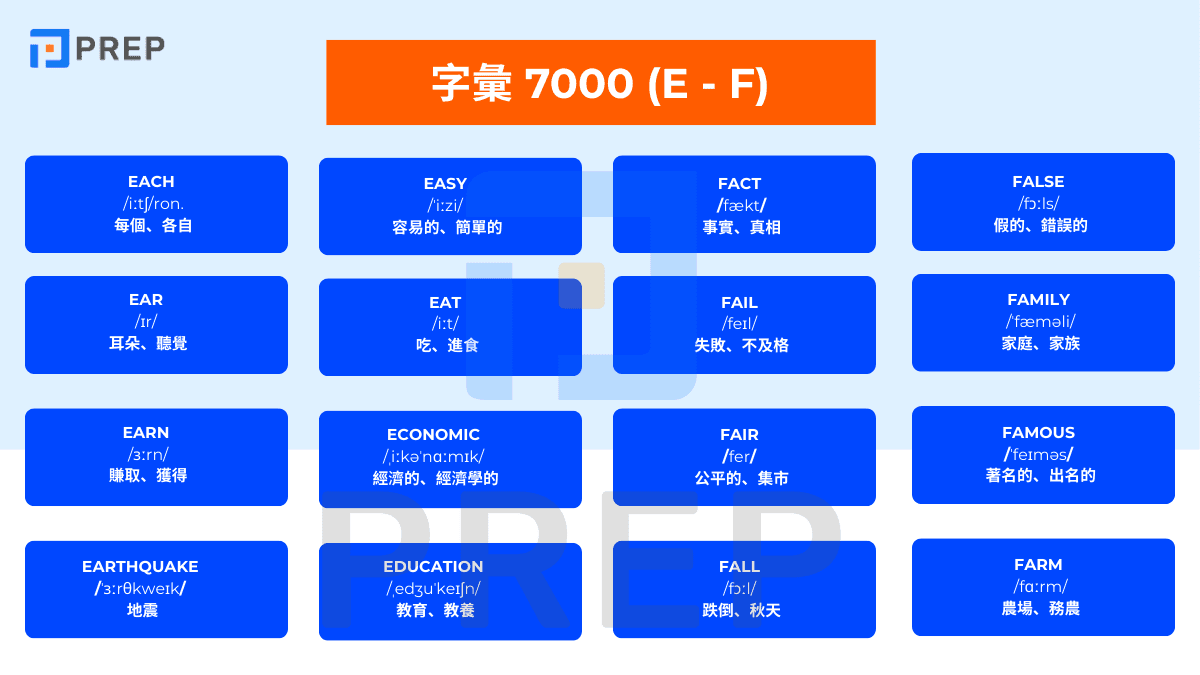 參考更多相關文章:
參考更多相關文章:
4. 字彙 7000 (G - H - I - J)
|
英文單字 7000 |
意思 |
例句 |
|
gain /ɡeɪn/ (v./n.) |
獲得、增加 |
Students gain knowledge through experience. (學生透過經驗獲得知識。) |
|
game /ɡeɪm/ (n.) |
遊戲、比賽 |
Educational games make learning enjoyable. (教育遊戲讓學習變得有趣。) |
|
garden /ˈɡɑːrdn/ (n.) |
花園、菜園 |
The school garden teaches students about nature. (學校花園教導學生關於自然。) |
|
gas /ɡæs/ (n.) |
氣體、汽油 |
Natural gas provides energy for cooking. (天然氣為烹飪提供能源。) |
|
general /ˈdʒenərəl/ (adj./n.) |
一般的、將軍 |
General knowledge helps in many situations. (常識在許多情況下都有幫助。) |
|
generate /ˈdʒenəreɪt/ (v.) |
產生、生成 |
Solar panels generate clean electricity. (太陽能板產生清潔電力。) |
|
gift /ɡɪft/ (n.) |
禮物、天賦 |
Music is her natural gift. (音樂是她的天賦。) |
|
girl /ɡɜːrl/ (n.) |
女孩、姑娘 |
The young girl excelled in mathematics. (年輕女孩在數學方面表現出色。) |
|
give /ɡɪv/ (v.) |
給予、提供 |
Teachers give students valuable feedback. (老師給學生寶貴的反饋。) |
|
glass /ɡlæs/ (n.) |
玻璃、眼鏡 |
The glass windows let in natural light. (玻璃窗讓自然光進入。) |
|
global /ˈɡloʊbl/ (adj.) |
全球的、全世界的 |
Global warming affects everyone. (全球暖化影響每個人。) |
|
goal /ɡoʊl/ (n.) |
目標、進球 |
Setting clear goals motivates students. (設定明確目標激勵學生。) |
|
gold /ɡoʊld/ (n./adj.) |
黃金、金色的 |
The gold medal represents excellence. (金牌代表卓越。) |
|
good /ɡʊd/ (adj.) |
好的、良好的 |
Good study habits improve academic performance. (良好的學習習慣提升學術表現。) |
|
government /ˈɡʌvərnmənt/ (n.) |
政府 |
Democratic governments serve the people. (民主政府為人民服務。) |
|
grade /ɡreɪd/ (n./v.) |
年級、評分 |
Teachers grade assignments fairly. (老師公平地評分作業。) |
|
grand /ɡrænd/ (adj.) |
宏偉的、重大的 |
The grand library impressed all visitors. (宏偉的圖書館讓所有訪客印象深刻。) |
|
great /ɡreɪt/ (adj.) |
偉大的、極好的 |
Great teachers inspire lifelong learning. (偉大的老師啟發終身學習。) |
|
green /ɡriːn/ (adj./n.) |
綠色的、綠色 |
Green plants purify the air naturally. (綠色植物自然地淨化空氣。) |
|
ground /ɡraʊnd/ (n.) |
地面、根據 |
The playground ground was covered with grass. (操場地面覆蓋著草。) |
|
group /ɡruːp/ (n./v.) |
群體、分組 |
Study groups enhance collaborative learning. (學習小組增強協作學習。) |
|
grow /ɡroʊ/ (v.) |
成長、種植 |
Children grow physically and intellectually. (孩子在身體和智力上成長。) |
|
guard /ɡɑːrd/ (n./v.) |
守衛、保護 |
Security guards protect school property. (保安人員保護學校財產。) |
|
guess /ɡes/ (v./n.) |
猜測、推測 |
Students guess answers when uncertain. (學生不確定時會猜測答案。) |
|
guest /ɡest/ (n.) |
客人、嘉賓 |
The guest speaker inspired the students. (客座講者啟發了學生們。) |
|
habit /ˈhæbɪt/ (n.) |
習慣、嗜好 |
Good study habits improve academic performance. (良好的學習習慣提升學術表現。) |
|
hair /her/ (n.) |
頭髮、毛髮 |
She tied her long hair in a ponytail. (她把長髮紮成馬尾。) |
|
half /hæf/ (n./adj.) |
一半、半個 |
Half the students passed the exam. (一半的學生通過了考試。) |
|
hall /hɔːl/ (n.) |
大廳、走廊 |
The assembly hall accommodated all students. (大會堂容納了所有學生。) |
|
hand /hænd/ (n.) |
手、指針 |
Skilled hands create beautiful artwork. (靈巧的雙手創造美麗的藝術作品。) |
|
handle /ˈhændl/ (v./n.) |
處理、把手 |
Students learn to handle stress effectively. (學生學會有效地處理壓力。) |
|
hang /hæŋ/ (v.) |
懸掛、吊 |
Students hang artwork on classroom walls. (學生將藝術作品掛在教室牆上。) |
|
happen /ˈhæpən/ (v.) |
發生、出現 |
Learning breakthroughs happen with persistence. (學習突破在堅持下發生。) |
|
happy /ˈhæpi/ (adj.) |
快樂的、高興的 |
Happy students learn more effectively. (快樂的學生學習更有效。) |
|
hard /hɑːrd/ (adj./adv.) |
困難的、努力地 |
Hard work leads to academic success. (努力工作導致學術成功。) |
|
hat /hæt/ (n.) |
帽子 |
She wore a hat to protect from sun. (她戴帽子防曬。) |
|
hate /heɪt/ (v./n.) |
恨、討厭 |
Students hate unfair treatment. (學生討厭不公平待遇。) |
|
have /hæv/ (v.) |
有、擁有 |
All students have equal learning opportunities. (所有學生都有平等的學習機會。) |
|
head /hed/ (n./v.) |
頭、領導 |
The department head supervised new teachers. (系主任監督新教師。) |
|
health /helθ/ (n.) |
健康 |
Regular exercise maintains good health. (定期運動維持良好健康。) |
|
hear /hɪr/ (v.) |
聽到、聽說 |
Students hear instructions clearly. (學生清楚地聽到指示。) |
|
heart /hɑːrt/ (n.) |
心臟、心 |
A healthy heart pumps blood efficiently. (健康的心臟有效地泵血。) |
|
heat /hiːt/ (n./v.) |
熱、加熱 |
The classroom heat made students sleepy. (教室的熱氣讓學生昏昏欲睡。) |
|
heavy /ˈhevi/ (adj.) |
重的、嚴重的 |
Heavy textbooks strain students' backs. (沉重的教科書讓學生背部拉傷。) |
|
height /haɪt/ (n.) |
高度、身高 |
The building's height impressed visitors. (建築物的高度讓訪客印象深刻。) |
|
help /help/ (v./n.) |
幫助、協助 |
Teachers help students overcome challenges. (老師幫助學生克服挑戰。) |
|
her /hər/ (pron.) |
她的、她 |
Her dedication inspired fellow students. (她的奉獻精神啟發了同學們。) |
|
here /hɪr/ (adv.) |
這裡、在此 |
Here is where learning happens daily. (這裡是每天學習發生的地方。) |
|
hero /ˈhɪroʊ/ (n.) |
英雄、主角 |
Teachers are unsung heroes of society. (老師是社會的無名英雄。) |
|
hide /haɪd/ (v.) |
隱藏、躲藏 |
Students cannot hide from their responsibilities. (學生無法逃避責任。) |
|
high /haɪ/ (adj./adv.) |
高的、高級的 |
High standards ensure quality education. (高標準確保優質教育。) |
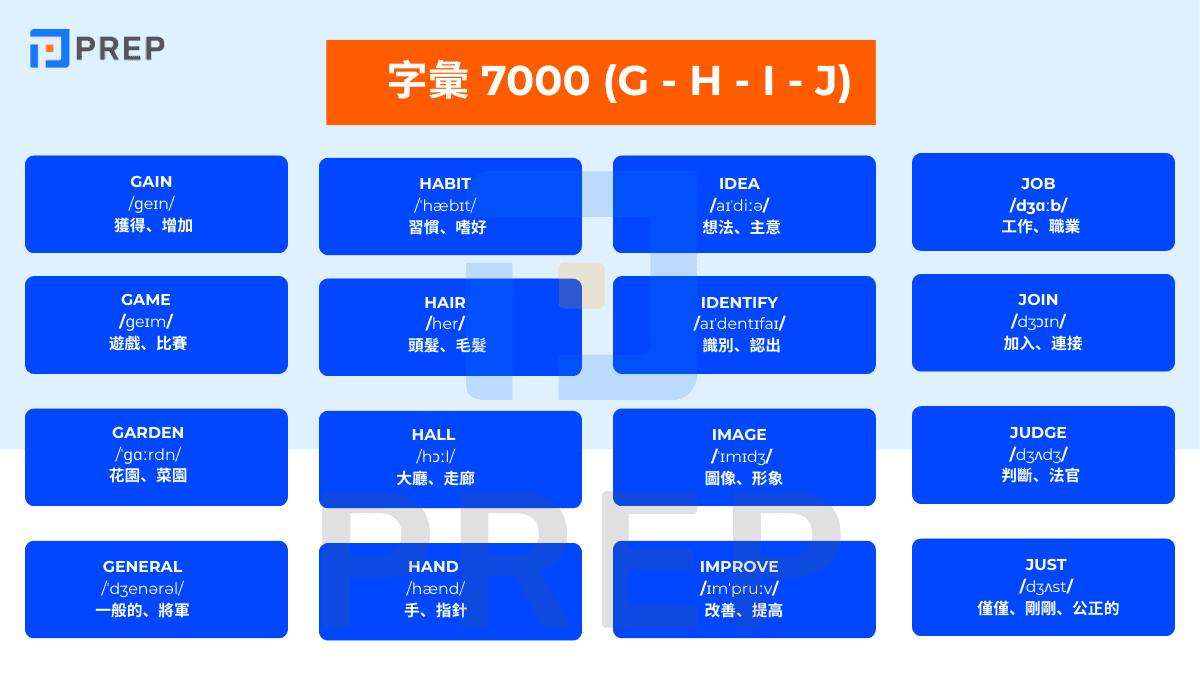
參考更多相關文章:
5. 字彙 7000 (K - L - M)
|
英文單字 7000 |
意思 |
例句 |
|
keep /kiːp/ (v.) |
保持、維持 |
Students keep learning throughout their lives. (學生終生保持學習。) |
|
key /kiː/ (n./adj.) |
鑰匙、關鍵的 |
Understanding is the key to effective learning. (理解是有效學習的關鍵。) |
|
kick /kɪk/ (v./n.) |
踢、踢腿 |
Soccer players kick the ball skillfully. (足球運動員熟練地踢球。) |
|
kid /kɪd/ (n.) |
小孩、孩子 |
Every kid deserves quality education. (每個孩子都應得到優質教育。) |
|
kill /kɪl/ (v.) |
殺死、消除 |
Stress can kill motivation and creativity. (壓力會扼殺動機和創造力。) |
|
kind /kaɪnd/ (n./adj.) |
種類、善良的 |
Kind teachers create supportive learning environments. (善良的老師創造支持性學習環境。) |
|
king /kɪŋ/ (n.) |
國王、王者 |
The chess king is the most important piece. (國際象棋中國王是最重要的棋子。) |
|
kitchen /ˈkɪtʃən/ (n.) |
廚房 |
The school kitchen serves nutritious meals. (學校廚房提供營養餐點。) |
|
knee /niː/ (n.) |
膝蓋 |
Basketball players protect their knees carefully. (籃球運動員小心保護膝蓋。) |
|
knife /naɪf/ (n.) |
刀子、刀具 |
The knife must be handled safely. (刀子必須安全使用。) |
|
knock /nɑːk/ (v./n.) |
敲、敲門 |
Students knock before entering the office. (學生進辦公室前先敲門。) |
|
know /noʊ/ (v.) |
知道、了解 |
Students know more when they ask questions. (學生提問時會了解更多。) |
|
knowledge /ˈnɑːlɪdʒ/ (n.) |
知識、學問 |
Knowledge empowers individuals to make better choices. (知識使個人能夠做出更好的選擇。) |
|
lack /læk/ (v./n.) |
缺乏、不足 |
Students should not lack access to resources. (學生不應該缺乏資源。) |
|
lady /ˈleɪdi/ (n.) |
女士、淑女 |
The lady donated books to the library. (女士向圖書館捐贈書籍。) |
|
lake /leɪk/ (n.) |
湖、湖泊 |
The school trip visited a beautiful lake. (學校旅行參觀了美麗的湖泊。) |
|
land /lænd/ (n./v.) |
土地、著陸 |
Agricultural land produces food for society. (農業用地為社會生產糧食。) |
|
language /ˈlæŋɡwɪdʒ/ (n.) |
語言 |
Language connects people across cultures. (語言連接跨文化的人們。) |
|
large /lɑːrdʒ/ (adj.) |
大的、廣泛的 |
Large vocabularies improve communication skills. (豐富的詞彙提升溝通技巧。) |
|
last /læst/ (adj./v.) |
最後的、持續 |
Good education benefits last a lifetime. (良好教育的益處持續一生。) |
|
late /leɪt/ (adj./adv.) |
遲的、晚的 |
Late study sessions affect concentration. (深夜學習影響注意力。) |
|
laugh /læf/ (v./n.) |
笑、大笑 |
Students laugh during enjoyable lessons. (學生在有趣的課程中大笑。) |
|
law /lɔː/ (n.) |
法律、法則 |
Educational laws protect student rights. (教育法律保護學生權利。) |
|
lay /leɪ/ (v.) |
放置、躺下 |
Teachers lay the foundation for learning. (老師為學習奠定基礎。) |
|
lead /liːd/ (v./n.) |
領導、引導 |
Great teachers lead by example. (優秀的老師以身作則領導。) |
|
leader /ˈliːdər/ (n.) |
領導者、領袖 |
Student leaders organize school activities. (學生領袖組織學校活動。) |
|
learn /lɜːrn/ (v.) |
學習、得知 |
Children learn best through active engagement. (孩子通過積極參與學得最好。) |
|
least /liːst/ (adj./adv.) |
最少的、最小的 |
Every student needs at least basic education. (每個學生至少需要基礎教育。) |
|
leave /liːv/ (v.) |
離開、留下 |
Students leave school with valuable skills. (學生帶著寶貴技能離開學校。) |
|
left /left/ (adj./n.) |
左邊的、左側 |
Turn left at the library entrance. (在圖書館入口向左轉。) |
|
leg /leɡ/ (n.) |
腿、支柱 |
Athletes strengthen their legs through training. (運動員通過訓練強化腿部。) |
|
legal /ˈliːɡl/ (adj.) |
法律的、合法的 |
Legal education teaches about rights and duties. (法學教育教授權利和義務。) |
|
less /les/ (adj./adv.) |
更少的、較少 |
Less homework allows more family time. (較少的作業允許更多家庭時間。) |
|
lesson /ˈlesn/ (n.) |
課程、教訓 |
Each lesson builds upon previous knowledge. (每堂課都建立在先前知識之上。) |
|
let /let/ (v.) |
讓、允許 |
Teachers let students explore their interests. (老師讓學生探索興趣。) |
|
letter /ˈletər/ (n.) |
字母、信件 |
Each letter has a specific sound. (每個字母都有特定的聲音。) |
|
level /ˈlevl/ (n./adj.) |
水平、程度 |
Advanced level courses challenge students. (高級課程挑戰學生。) |
|
library /ˈlaɪbreri/ (n.) |
圖書館 |
The library provides quiet study spaces. (圖書館提供安靜的學習空間。) |
|
lie /laɪ/ (v./n.) |
說謊、躺下 |
Honesty means never telling a lie. (誠實意味著從不說謊。) |
|
life /laɪf/ (n.) |
生活、生命 |
Education enriches life experiences. (教育豐富人生經歷。) |
|
lift /lɪft/ (v./n.) |
舉起、電梯 |
Education lifts people out of poverty. (教育使人們擺脫貧困。) |
|
light /laɪt/ (n./adj.) |
光、輕的 |
Natural light improves learning environments. (自然光改善學習環境。) |
|
like /laɪk/ (v./prep.) |
喜歡、像 |
Students like interactive learning activities. (學生喜歡互動學習活動。) |
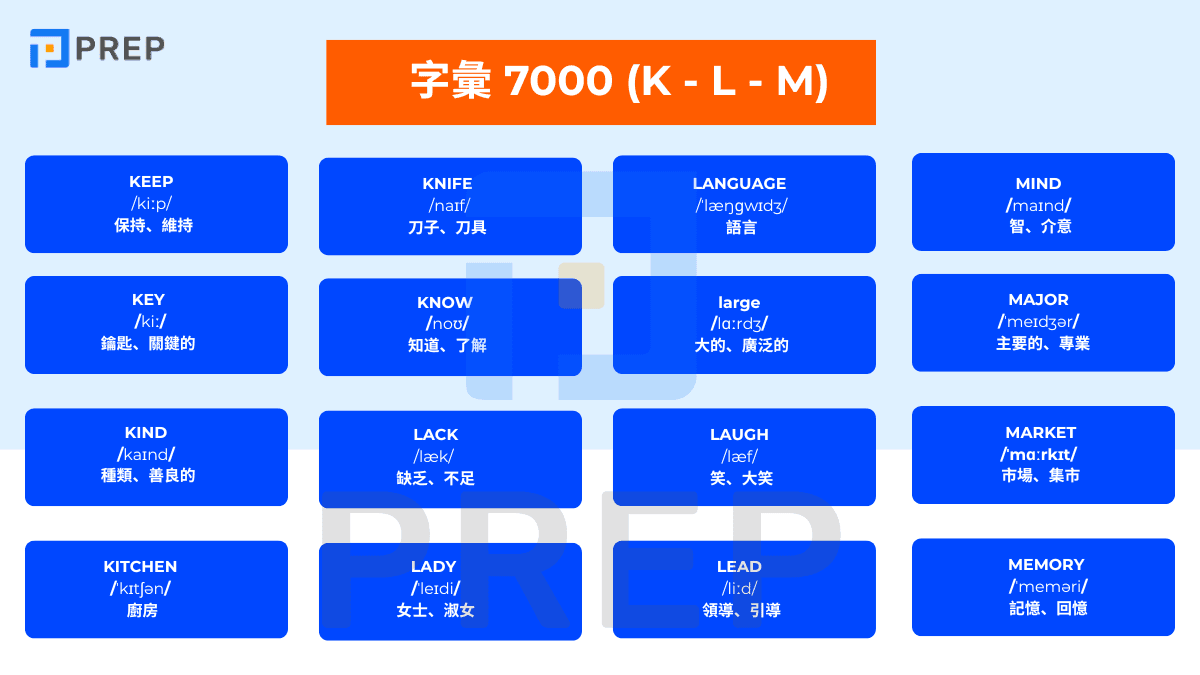
參考更多相關文章:
6. 字彙 7000 (N - O)
|
英文單字 7000 |
意思 |
例句 |
|
name /neɪm/ (n./v.) |
名字、命名 |
Each student has a unique name and identity. (每個學生都有獨特的姓名和身分。) |
|
nation /ˈneɪʃn/ (n.) |
國家、民族 |
Education strengthens the nation's future. (教育強化國家的未來。) |
|
natural /ˈnætʃərəl/ (adj.) |
自然的、天然的 |
Natural curiosity drives effective learning. (天然好奇心驅動有效學習。) |
|
nature /ˈneɪtʃər/ (n.) |
自然、本性 |
Understanding human nature helps teachers connect with students. (理解人性幫助教師與學生建立聯繫。) |
|
near /nɪr/ (adj./prep.) |
接近的、靠近 |
The library is near the science building. (圖書館靠近科學大樓。) |
|
necessary /ˈnesəseri/ (adj.) |
必要的、必需的 |
Regular practice is necessary for skill development. (定期練習對技能發展是必要的。) |
|
neck /nek/ (n.) |
脖子、頸部 |
Students stretch their necks during breaks. (學生在休息時伸展脖子。) |
|
need /niːd/ (v./n.) |
需要、需求 |
Students need supportive learning environments. (學生需要支持性學習環境。) |
|
neighbor /ˈneɪbər/ (n.) |
鄰居、鄰近的 |
School neighbors support educational activities. (學校鄰居支持教育活動。) |
|
neither /ˈniːðər/ (det./conj.) |
兩者都不、也不 |
Neither teacher nor student gave up easily. (老師和學生都沒有輕易放棄。) |
|
nerve /nɜːrv/ (n.) |
神經、勇氣 |
It takes nerve to speak in public. (公開演講需要勇氣。) |
|
net /net/ (n./adj.) |
網、網路的 |
The internet net connects global learners. (網際網路連接全球學習者。) |
|
network /ˈnetwɜːrk/ (n./v.) |
網絡、建立關係 |
Social networks enhance learning opportunities. (社交網絡增強學習機會。) |
|
neutral /ˈnuːtrəl/ (adj.) |
中立的、中性的 |
Teachers remain neutral in student conflicts. (老師在學生衝突中保持中立。) |
|
never /ˈnevər/ (adv.) |
從不、絕不 |
Good teachers never stop learning themselves. (好老師從不停止自我學習。) |
|
new /nuː/ (adj.) |
新的、新鮮的 |
New technologies transform education methods. (新技術改變教育方法。) |
|
news /nuːz/ (n.) |
新聞、消息 |
Current news connects classroom learning to real world. (時事新聞將課堂學習與現實世界聯繫起來。) |
|
next /nekst/ (adj./adv.) |
下一個、接下來 |
Next semester offers advanced courses. (下學期提供高級課程。) |
|
nice /naɪs/ (adj.) |
好的、令人愉快的 |
Nice weather encourages outdoor learning. (好天氣鼓勵戶外學習。) |
|
night /naɪt/ (n.) |
夜晚、晚上 |
Some students study late into the night. (一些學生學習到深夜。) |
|
nine /naɪn/ (num.) |
九、九個 |
The course lasts nine months. (課程持續九個月。) |
|
nobody /ˈnoʊbɑːdi/ (pron.) |
沒有人、無人 |
Nobody should be denied education. (沒有人應該被剝奪教育。) |
|
noise /nɔɪz/ (n.) |
噪音、雜音 |
Excessive noise disrupts concentration. (過多噪音干擾專注力。) |
|
none /nʌn/ (pron.) |
沒有、無一 |
None of the students failed the test. (學生中沒有人考試不及格。) |
|
normal /ˈnɔːrml/ (adj.) |
正常的、標準的 |
Making mistakes is normal in the learning process. (在學習過程中犯錯是正常的。) |
|
north /nɔːrθ/ (n./adj.) |
北方、北部的 |
The north campus has new facilities. (北校區有新設施。) |
|
nose /noʊz/ (n.) |
鼻子 |
Students cover their nose when sneezing. (學生打噴嚏時摀住鼻子。) |
|
object /ˈɑːbdʒɪkt/ (n.) |
物體、目標 |
Learning objects should engage multiple senses. (學習物件應該調動多種感官。) |
|
observe /əbˈzɜːrv/ (v.) |
觀察、遵守 |
Scientists observe phenomena carefully. (科學家仔細觀察現象。) |
|
obtain /əbˈteɪn/ (v.) |
獲得、取得 |
Students obtain knowledge through various methods. (學生通過各種方法獲得知識。) |
|
obvious /ˈɑːbviəs/ (adj.) |
明顯的、顯而易見的 |
The benefits of education are obvious to everyone. (教育的益處對每個人都是顯而易見的。) |
|
occasion /əˈkeɪʒn/ (n.) |
場合、機會 |
Graduation is a special occasion for families. (畢業是家庭的特殊場合。) |
|
occur /əˈkɜːr/ (v.) |
發生、出現 |
Learning breakthroughs occur through persistent effort. (學習突破通過持續努力而發生。) |
|
ocean /ˈoʊʃn/ (n.) |
海洋 |
Marine biology students study ocean ecosystems. (海洋生物學學生研究海洋生態系統。) |
|
odd /ɑːd/ (adj.) |
奇怪的、奇數的 |
Odd numbers include 1, 3, and 5. (奇數包括1、3和5。) |
|
of /ʌv/ (prep.) |
的、屬於 |
Education is the key of success. (教育是成功的關鍵。) |
|
off /ɔːf/ (adv./prep.) |
離開、關閉 |
Students turn off phones during class. (學生上課時關閉手機。) |
|
offer /ˈɔːfər/ (v./n.) |
提供、提議 |
Universities offer diverse academic programs. (大學提供多樣化的學術項目。) |
|
office /ˈɔːfɪs/ (n.) |
辦公室、職務 |
The principal's office handles student issues. (校長辦公室處理學生問題。) |
|
often /ˈɔːfən/ (adv.) |
經常、常常 |
Successful students often review their notes regularly. (成功的學生經常定期複習筆記。) |
|
oil /ɔɪl/ (n.) |
油、石油 |
Art students use oil paints for portraits. (藝術學生使用油畫顏料畫肖像。) |
|
old /oʊld/ (adj.) |
老的、舊的 |
Old learning methods can still be effective today. (舊的學習方法在今天仍然有效。) |
|
on /ɑːn/ (prep./adv.) |
在...上、關於 |
Students focus on their studies. (學生專注於學習。) |
|
once /wʌns/ (adv.) |
一次、曾經 |
Once students master basics, advanced topics follow. (學生一旦掌握基礎,高級主題就會跟上。) |
|
one /wʌn/ (num./pron.) |
一、一個 |
One teacher can impact many lives. (一位老師可以影響許多生命。) |
|
only /ˈoʊnli/ (adv./adj.) |
只有、唯一的 |
Only persistent effort leads to mastery. (只有持續努力才能達到精通。) |
|
open /ˈoʊpən/ (adj./v.) |
開放的、打開 |
Open communication enhances teacher-student relationships. (開放的溝通增強師生關係。) |
|
operate /ˈɑːpəreɪt/ (v.) |
操作、運行 |
Students learn to operate laboratory equipment. (學生學會操作實驗室設備。) |
|
opinion /əˈpɪnjən/ (n.) |
意見、觀點 |
Students express their opinions in debates. (學生在辯論中表達觀點。) |
|
opportunity /ˌɑːpərˈtuːnəti/ (n.) |
機會、時機 |
Education creates opportunities for personal growth. (教育為個人成長創造機會。) |
|
opposite /ˈɑːpəzɪt/ (adj./n.) |
相反的、對面 |
Students sit opposite each other during discussions. (學生在討論時面對面坐著。) |
|
option /ˈɑːpʃn/ (n.) |
選擇、選項 |
Students have many course options available. (學生有很多課程選擇。) |
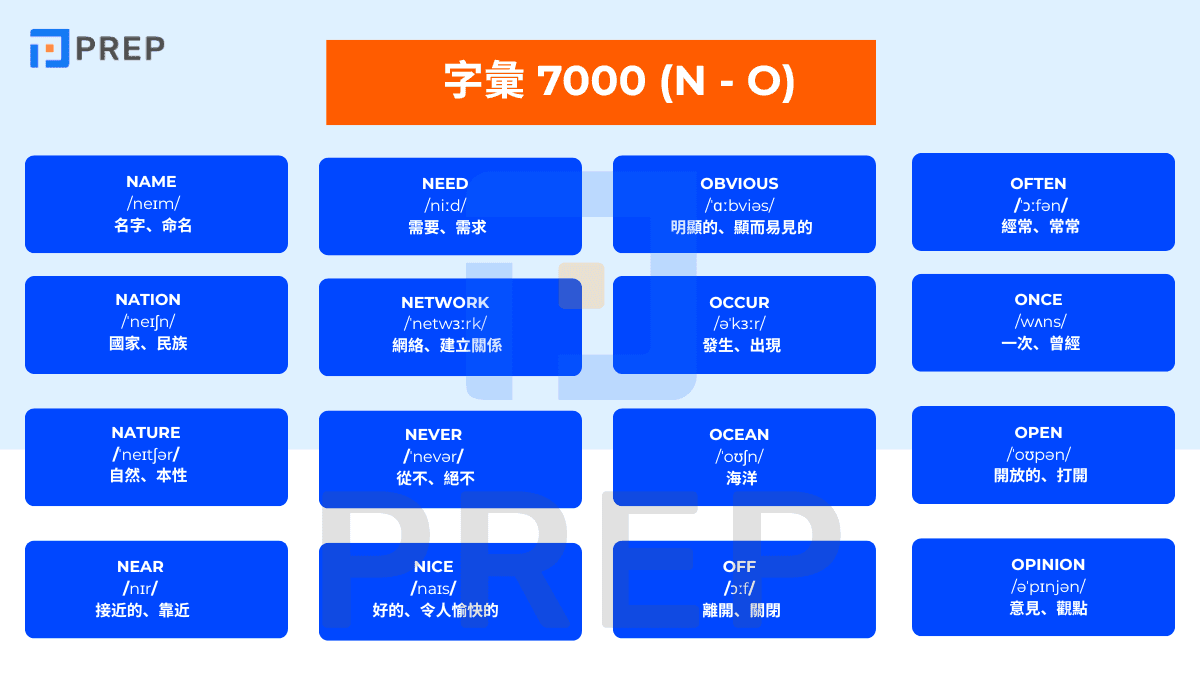
參考更多相關文章:
7. 字彙 7000 (P - Q - R)
|
英文單字 7000 |
意思 |
例句 |
|
pack /pæk/ (v./n.) |
打包、包裝 |
Students pack books for the field trip. (學生為實地考察打包書籍。) |
|
page /peɪdʒ/ (n.) |
頁面、頁數 |
Students read every page of the assignment. (學生閱讀作業的每一頁。) |
|
pain /peɪn/ (n.) |
疼痛、痛苦 |
Growing pains are part of learning. (成長的痛苦是學習的一部分。) |
|
paint /peɪnt/ (n./v.) |
油漆、繪畫 |
Art students paint beautiful landscapes. (藝術學生繪畫美麗的風景。) |
|
pair /per/ (n./v.) |
一對、配對 |
Students work in pairs for projects. (學生成對進行項目工作。) |
|
paper /ˈpeɪpər/ (n.) |
紙張、論文 |
Students write research papers carefully. (學生仔細撰寫研究論文。) |
|
parent /ˈperənt/ (n.) |
父母、親代 |
Parents support their children's education. (父母支持孩子的教育。) |
|
park /pɑːrk/ (n./v.) |
公園、停車 |
Students study in the quiet park. (學生在安靜的公園學習。) |
|
part /pɑːrt/ (n.) |
部分、角色 |
Each student plays a part in class success. (每個學生在班級成功中扮演角色。) |
|
particular /pərˈtɪkjələr/ (adj.) |
特別的、特定的 |
This particular method works well. (這種特定方法效果很好。) |
|
partner /ˈpɑːrtnər/ (n.) |
夥伴、搭檔 |
Study partners help each other learn. (學習夥伴互相幫助學習。) |
|
party /ˈpɑːrti/ (n.) |
聚會、政黨 |
The graduation party celebrated achievements. (畢業聚會慶祝成就。) |
|
pass /pæs/ (v./n.) |
通過、及格 |
All students hope to pass their exams. (所有學生都希望通過考試。) |
|
past /pæst/ (adj./n.) |
過去的、過去 |
Students learn from past experiences. (學生從過去的經驗中學習。) |
|
path /pæθ/ (n.) |
道路、路徑 |
Education opens many career paths. (教育開啟許多職業道路。) |
|
patient /ˈpeɪʃnt/ (adj./n.) |
耐心的、病人 |
Patient teachers help struggling students. (耐心的老師幫助有困難的學生。) |
|
pattern /ˈpætərn/ (n.) |
模式、圖案 |
Recognizing patterns accelerates language learning. (識別模式加速語言學習。) |
|
pay /peɪ/ (v./n.) |
支付、薪水 |
Hard work pays off in education. (在教育中努力工作會有回報。) |
|
peace /piːs/ (n.) |
和平、平靜 |
The library provides peace for studying. (圖書館為學習提供平靜。) |
|
pen /pen/ (n.) |
筆、鋼筆 |
Students write notes with a pen. (學生用筆做筆記。) |
|
people /ˈpiːpl/ (n.) |
人們、民族 |
Education empowers people to improve their lives. (教育使人們能夠改善生活。) |
|
perfect /ˈpɜːrfɪkt/ (adj.) |
完美的、理想的 |
Perfect pronunciation requires continuous practice. (完美發音需要持續練習。) |
|
perform /pərˈfɔːrm/ (v.) |
表演、執行 |
Students perform well with proper preparation. (學生在適當準備下表現良好。) |
|
perhaps /pərˈhæps/ (adv.) |
也許、可能 |
Perhaps the most important skill is learning how to learn. (也許最重要的技能是學會如何學習。) |
|
period /ˈpɪriəd/ (n.) |
時期、句號 |
The study period lasts two hours. (學習時間持續兩小時。) |
|
quality /ˈkwɑːləti/ (n.) |
質量、品質 |
Quality education requires skilled teachers and resources. (優質教育需要技能嫻熟的教師和資源。) |
|
question /ˈkwestʃən/ (n./v.) |
問題、質疑 |
Asking good questions deepens understanding. (提出好問題加深理解。) |
|
quick /kwɪk/ (adj.) |
快速的、敏捷的 |
Quick learners often use effective study strategies. (快速學習者通常使用有效的學習策略。) |
|
quiet /ˈkwaɪət/ (adj./n.) |
安靜的、寧靜 |
Quiet environments enhance concentration. (安靜的環境增強專注力。) |
|
quite /kwaɪt/ (adv.) |
相當、完全 |
Mastering vocabulary is quite challenging but rewarding. (掌握詞彙相當具有挑戰性但很有回報。) |
|
race /reɪs/ (n./v.) |
種族、賽跑 |
Students of every race deserve equal opportunities. (每個種族的學生都應得到平等機會。) |
|
radio /ˈreɪdioʊ/ (n.) |
收音機、無線電 |
Educational radio programs reach remote areas. (教育廣播節目到達偏遠地區。) |
|
raise /reɪz/ (v./n.) |
提高、舉起 |
Good teachers raise student expectations. (好老師提高學生期望。) |
|
range /reɪndʒ/ (n./v.) |
範圍、變化 |
Vocabulary ranges from basic to advanced levels. (詞彙從基礎到高級水平都有。) |
|
rate /reɪt/ (n./v.) |
比率、評級 |
Learning rates vary among different students. (學習速度在不同學生之間有差異。) |
|
rather /ˈræðər/ (adv.) |
相當、寧可 |
Students prefer interactive rather than passive learning. (學生更喜歡互動而非被動學習。) |
|
reach /riːtʃ/ (v.) |
到達、達到 |
Persistent effort helps students reach their goals. (持續努力幫助學生達到目標。) |
|
read /riːd/ (v.) |
閱讀、理解 |
Students who read extensively develop better vocabulary. (廣泛閱讀的學生發展更好的詞彙。) |
|
ready /ˈredi/ (adj.) |
準備好的、樂意的 |
Students are ready for new challenges. (學生為新挑戰做好準備。) |
|
real /riːl/ (adj.) |
真實的、實際的 |
Real applications make abstract concepts concrete. (實際應用使抽象概念具體化。) |
|
really /ˈriːli/ (adv.) |
真正地、確實 |
Students really benefit from dedicated teachers. (學生確實從專心的老師那裡受益。) |
|
reason /ˈriːzn/ (n./v.) |
原因、推理 |
Understanding the reason behind rules improves compliance. (理解規則背後的原因提高遵守性。) |
|
receive /rɪˈsiːv/ (v.) |
接收、獲得 |
Students receive feedback to improve their performance. (學生接受反饋以提升表現。) |
|
recent /ˈriːsnt/ (adj.) |
最近的、近期的 |
Recent research supports new teaching methods. (最近的研究支持新的教學方法。) |
|
recognize /ˈrekəɡnaɪz/ (v.) |
認出、承認 |
Teachers recognize each student's unique talents. (老師認識到每個學生的獨特才能。) |
|
record /ˈrekərd/ (n./v.) |
記錄、錄音 |
Keeping learning records tracks progress over time. (保持學習記錄追蹤長期進步。) |
|
red /red/ (adj./n.) |
紅色的、紅色 |
The red pen marks important corrections. (紅筆標記重要的修正。) |
|
reduce /rɪˈduːs/ (v.) |
減少、降低 |
Study groups reduce individual workload stress. (學習小組減少個人工作負荷壓力。) |
|
refer /rɪˈfɜːr/ (v.) |
提及、參考 |
Students refer to textbooks for information. (學生參考教科書獲取信息。) |
|
reflect /rɪˈflekt/ (v.) |
反映、反思 |
Good students reflect on their learning progress. (好學生反思學習進度。) |
|
region /ˈriːdʒən/ (n.) |
地區、區域 |
Each region has different educational needs. (每個地區都有不同的教育需求。) |
|
relate /rɪˈleɪt/ (v.) |
相關、敘述 |
Students relate new knowledge to previous learning. (學生將新知識與先前學習聯繫起來。) |
|
relationship /rɪˈleɪʃnʃɪp/ (n.) |
關係、關聯 |
Teacher-student relationships affect learning outcomes. (師生關係影響學習成果。) |
|
remain /rɪˈmeɪn/ (v.) |
保持、剩餘 |
Students remain focused during long lectures. (學生在長時間講座中保持專注。) |
|
remember /rɪˈmembər/ (v.) |
記住、回憶 |
Students remember information better through active engagement. (學生通過積極參與更好地記住信息。) |
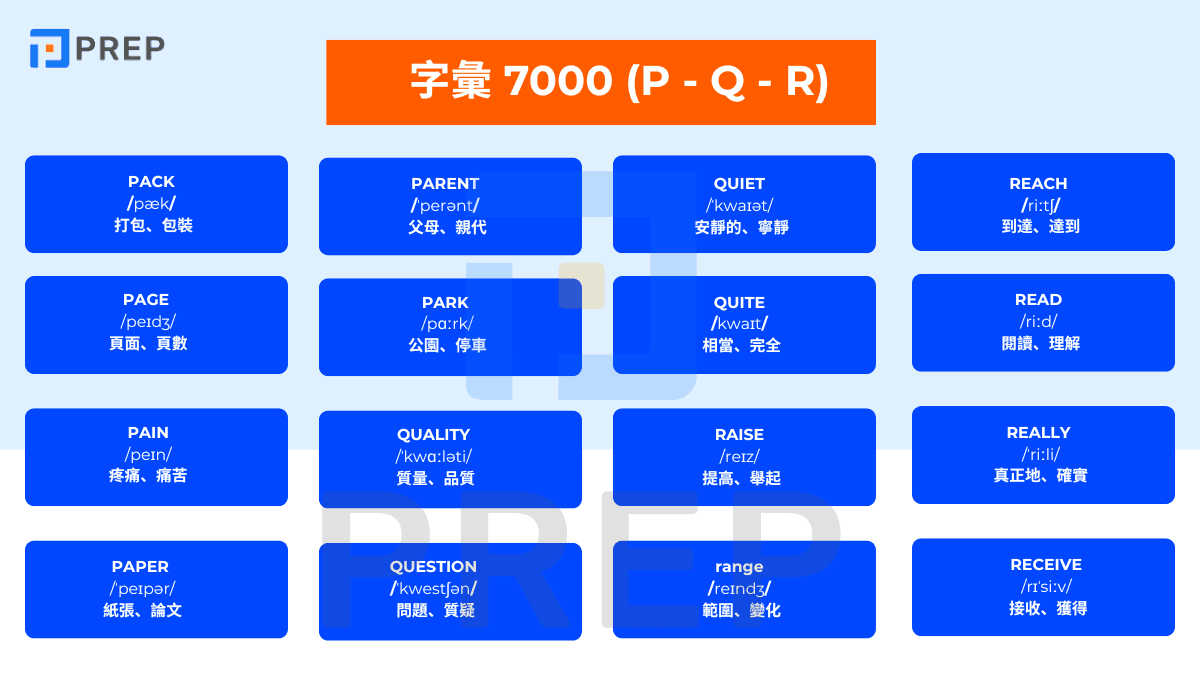
參考更多相關文章:
8. 字彙 7000 (S - T)
|
英文單字 7000 |
意思 |
例句 |
|
safe /seɪf/ (adj./n.) |
安全的、保險箱 |
Schools ensure students feel safe and protected. (學校確保學生感到安全和受保護。) |
|
same /seɪm/ (adj./pron.) |
相同的、同樣的 |
All students receive the same opportunities. (所有學生都獲得相同的機會。) |
|
save /seɪv/ (v.) |
拯救、節省 |
Education saves people from ignorance. (教育拯救人們免於無知。) |
|
say /seɪ/ (v.) |
說、講 |
Students say their opinions freely. (學生自由地表達意見。) |
|
scale /skeɪl/ (n./v.) |
規模、稱重 |
Educational programs operate on different scales. (教育項目以不同規模運作。) |
|
scene /siːn/ (n.) |
場景、景象 |
The graduation scene moved parents to tears. (畢業場景讓父母感動落淚。) |
|
school /skuːl/ (n.) |
學校、學派 |
Modern schools integrate technology into learning. (現代學校將技術融入學習。) |
|
science /ˈsaɪəns/ (n.) |
科學、學科 |
Science education develops analytical thinking skills. (科學教育發展分析思維技能。) |
|
score /skɔːr/ (n./v.) |
分數、得分 |
Students score higher with proper preparation. (學生通過適當準備獲得更高分數。) |
|
sea /siː/ (n.) |
海、海洋 |
Marine biology explores sea life diversity. (海洋生物學探索海洋生物多樣性。) |
|
season /ˈsiːzn/ (n.) |
季節、賽季 |
Each season brings different learning opportunities. (每個季節都帶來不同的學習機會。) |
|
seat /siːt/ (n./v.) |
座位、就座 |
Students take their seats before class begins. (學生在上課前就座。) |
|
second /ˈsekənd/ (num./adj.) |
第二、秒 |
The second semester focuses on advanced topics. (第二學期專注於高級主題。) |
|
section /ˈsekʃn/ (n.) |
部分、章節 |
Each textbook section covers specific concepts. (教科書的每個章節涵蓋特定概念。) |
|
see /siː/ (v.) |
看見、理解 |
Students see improvement through consistent effort. (學生通過持續努力看到進步。) |
|
seek /siːk/ (v.) |
尋求、追求 |
Students seek knowledge and understanding. (學生尋求知識和理解。) |
|
seem /siːm/ (v.) |
似乎、看起來 |
Difficult concepts seem easier with practice. (困難的概念通過練習看起來更容易。) |
|
sell /sel/ (v.) |
賣、出售 |
Students sell tickets for school events. (學生為學校活動出售門票。) |
|
send /send/ (v.) |
發送、派遣 |
Teachers send assignments via email. (老師通過電子郵件發送作業。) |
|
sense /sens/ (n./v.) |
感覺、理解 |
Students develop a sense of responsibility. (學生發展責任感。) |
|
serious /ˈsɪriəs/ (adj.) |
嚴重的、認真的 |
Serious students achieve better results. (認真的學生取得更好的結果。) |
|
serve /sɜːrv/ (v.) |
服務、供應 |
Education serves society's long-term needs. (教育服務社會的長期需求。) |
|
service /ˈsɜːrvɪs/ (n.) |
服務、服務業 |
School service programs benefit communities. (學校服務項目造福社區。) |
|
set /set/ (v./n.) |
設置、一套 |
Teachers set clear expectations for students. (老師為學生設定明確期望。) |
|
several /ˈsevrəl/ (det./pron.) |
幾個、數個 |
Several methods improve learning effectiveness. (幾種方法提高學習效果。) |
|
table /ˈteɪbl/ (n.) |
桌子、表格 |
Students gather around the discussion table. (學生圍坐在討論桌旁。) |
|
take /teɪk/ (v.) |
拿、服用 |
Students take notes during lectures. (學生在講座期間做筆記。) |
|
talk /tɔːk/ (v./n.) |
談話、講話 |
Students talk about their future goals. (學生談論未來目標。) |
|
task /tæsk/ (n.) |
任務、工作 |
Each task builds essential skills. (每個任務都建立基本技能。) |
|
tax /tæks/ (n./v.) |
稅、徵稅 |
Education funding comes from tax revenue. (教育資金來自稅收。) |
|
teach /tiːtʃ/ (v.) |
教授、教導 |
Experienced teachers teach with passion and expertise. (經驗豐富的教師以熱情和專業知識教學。) |
|
teacher /ˈtiːtʃər/ (n.) |
教師、老師 |
Great teachers inspire students to reach their potential. (偉大的教師激勵學生發揮潛力。) |
|
team /tiːm/ (n.) |
團隊、小組 |
Project teams collaborate effectively. (項目團隊有效合作。) |
|
technology /tekˈnɑːlədʒi/ (n.) |
技術、科技 |
Educational technology transforms traditional learning methods. (教育技術改變傳統學習方法。) |
|
television /ˈtelɪvɪʒn/ (n.) |
電視、電視機 |
Educational television programs supplement classroom learning. (教育電視節目補充課堂學習。) |
|
tell /tel/ (v.) |
告訴、說 |
Teachers tell inspiring stories to students. (老師向學生講述鼓舞人心的故事。) |
|
ten /ten/ (num.) |
十、十個 |
The course lasts ten weeks. (課程持續十週。) |
|
term /tɜːrm/ (n.) |
學期、術語 |
Spring term focuses on practical applications. (春季學期專注於實際應用。) |
|
test /test/ (n./v.) |
測試、考試 |
Regular tests assess student understanding. (定期測試評估學生理解程度。) |
|
text /tekst/ (n.) |
文本、教科書 |
Digital texts provide interactive learning experiences. (數位文本提供互動學習體驗。) |
|
than /ðæn/ (conj.) |
比、超過 |
Practice matters more than natural talent. (練習比天賦更重要。) |
|
thank /θæŋk/ (v./n.) |
感謝、謝謝 |
Students thank teachers for their guidance. (學生感謝老師的指導。) |
|
that /ðæt/ (det./pron.) |
那個、那 |
That method works for most students. (那種方法對大多數學生有效。) |
|
the /ðə/ (art.) |
定冠詞 |
The education system serves all children. (教育系統為所有兒童服務。) |
|
their /ðer/ (det.) |
他們的 |
Students improve their skills through practice. (學生通過練習提高技能。) |
|
them /ðem/ (pron.) |
他們、她們 |
Teachers encourage them to ask questions. (老師鼓勵他們提問。) |
|
then /ðen/ (adv.) |
然後、那時 |
Students learn basics, then advance topics. (學生學習基礎,然後是高級主題。) |
|
theory /ˈθiːəri/ (n.) |
理論、學說 |
Learning theories guide effective teaching practices. (學習理論指導有效的教學實踐。) |
|
there /ðer/ (adv.) |
那裡、在那裡 |
There are many learning opportunities available. (那裡有許多學習機會。) |
|
these /ðiːz/ (det./pron.) |
這些 |
These skills will benefit future careers. (這些技能將有益於未來職業。) |
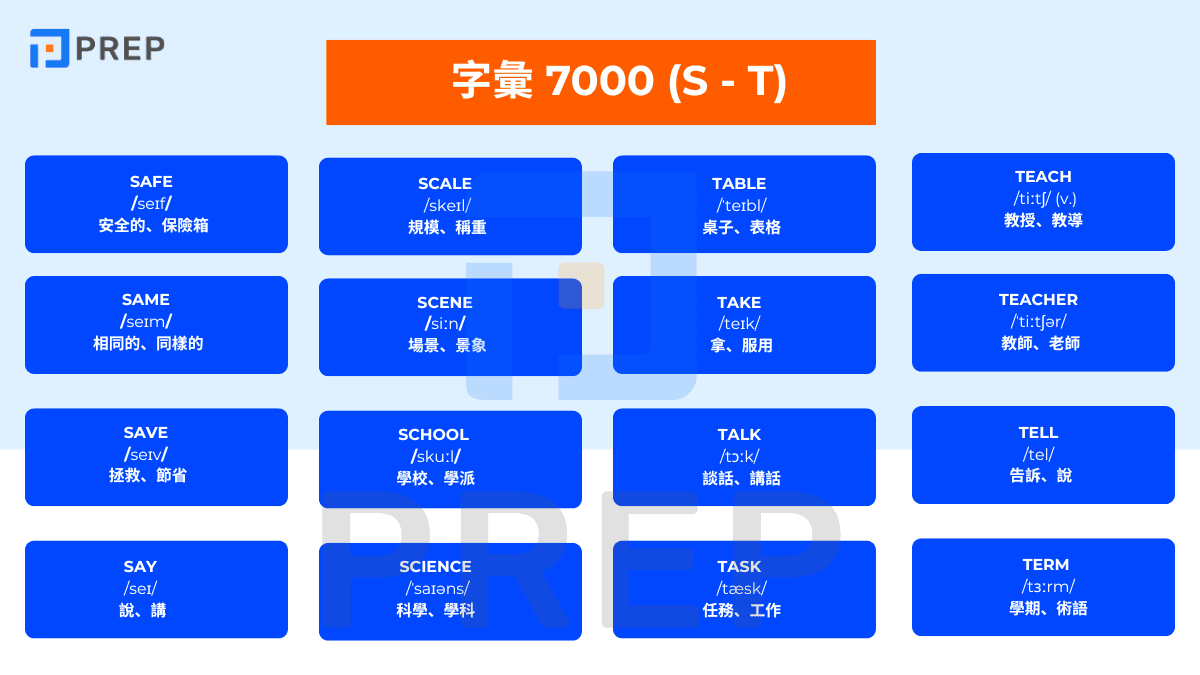
參考更多相關文章:
9. 字彙 7000 (U - V - W - X - Y - Z)
|
英文單字 7000 |
意思 |
例句 |
|
under /ˈʌndər/ (prep./adv.) |
在...下面、低於 |
Students work under teacher supervision. (學生在老師監督下工作。) |
|
understand /ˌʌndərˈstænd/ (v.) |
理解、明白 |
Students must understand concepts before applying them. (學生必須理解概念才能應用它們。) |
|
union /ˈjuːnjən/ (n.) |
聯盟、工會 |
Teacher unions advocate for education funding. (教師工會為教育資金倡議。) |
|
unit /ˈjuːnɪt/ (n.) |
單位、單元 |
Each curriculum unit builds on previous knowledge. (每個課程單元都建立在先前知識之上。) |
|
unite /juˈnaɪt/ (v.) |
聯合、團結 |
Common goals unite students and teachers. (共同目標團結學生和老師。) |
|
university /ˌjuːnɪˈvɜːrsəti/ (n.) |
大學 |
Universities provide advanced education and research opportunities. (大學提供高等教育和研究機會。) |
|
unless /ənˈles/ (conj.) |
除非、如果不 |
Students cannot succeed unless they study regularly. (學生除非定期學習否則無法成功。) |
|
until /ənˈtɪl/ (prep./conj.) |
直到、到...為止 |
Study until you master the material. (學習直到你掌握材料。) |
|
up /ʌp/ (adv./prep.) |
向上、上升 |
Test scores went up after extra practice. (額外練習後考試成績上升。) |
|
upon /əˈpɑːn/ (prep.) |
在...上、基於 |
Success depends upon consistent effort. (成功取決於持續努力。) |
|
urban /ˈɜːrbən/ (adj.) |
城市的、都市的 |
Urban schools face unique challenges. (城市學校面臨獨特挑戰。) |
|
use /juːz/ (v./n.) |
使用、用途 |
Effective teachers use diverse teaching methods. (有效的教師使用多樣化的教學方法。) |
|
used /juːzd/ (adj.) |
習慣的、二手的 |
Students become used to digital learning tools. (學生習慣了數位學習工具。) |
|
useful /ˈjuːsfəl/ (adj.) |
有用的、實用的 |
Useful skills prepare students for future careers. (有用的技能為學生未來職業做準備。) |
|
user /ˈjuːzər/ (n.) |
使用者、用戶 |
Library users access resources online. (圖書館使用者在線訪問資源。) |
|
usual /ˈjuːʒuəl/ (adj.) |
通常的、平常的 |
Students follow their usual study routine. (學生遵循通常的學習例行程序。) |
|
usually /ˈjuːʒuəli/ (adv.) |
通常、一般 |
Classes usually begin at eight o'clock. (課程通常在八點開始。) |
|
value /ˈvæljuː/ (n./v.) |
價值、重視 |
Education has immense value for personal development. (教育對個人發展有巨大價值。) |
|
variety /vəˈraɪəti/ (n.) |
多樣性、品種 |
Curriculum offers a variety of subjects. (課程提供多樣化的科目。) |
|
various /ˈveriəs/ (adj.) |
各種各樣的、不同的 |
Various learning styles require different teaching approaches. (各種學習風格需要不同的教學方法。) |
|
vehicle /ˈviːəkl/ (n.) |
車輛、工具 |
School vehicles transport students safely. (學校車輛安全運送學生。) |
|
version /ˈvɜːrʒn/ (n.) |
版本、說法 |
Digital versions of textbooks cost less. (數位版教科書成本較低。) |
|
very /ˈveri/ (adv./adj.) |
非常、很 |
Very dedicated students achieve excellence. (非常專心的學生達到卓越。) |
|
video /ˈvɪdioʊ/ (n.) |
視頻、錄像 |
Educational videos enhance understanding. (教育視頻增強理解。) |
|
view /vjuː/ (n./v.) |
觀點、看待 |
Students develop their own views through critical thinking. (學生通過批判性思考發展自己的觀點。) |
|
wait /weɪt/ (v./n.) |
等待、等候 |
Patience means learning to wait for results. (耐心意味著學會等待結果。) |
|
wake /weɪk/ (v./n.) |
醒來、喚醒 |
Students wake early for morning classes. (學生為晨課早起。) |
|
walk /wɔːk/ (v./n.) |
走、散步 |
Students walk to nearby libraries. (學生步行到附近圖書館。) |
|
wall /wɔːl/ (n.) |
牆、圍牆 |
Classroom walls display student artwork. (教室牆壁展示學生藝術作品。) |
|
want /wɑːnt/ (v./n.) |
想要、需要 |
Students want meaningful learning experiences. (學生想要有意義的學習經驗。) |
|
war /wɔːr/ (n.) |
戰爭 |
History lessons examine causes of war. (歷史課檢查戰爭原因。) |
|
warm /wɔːrm/ (adj./v.) |
溫暖的、使溫暖 |
Warm classrooms create comfortable learning environments. (溫暖的教室創造舒適的學習環境。) |
|
watch /wɑːtʃ/ (v./n.) |
觀看、手錶 |
Students watch educational documentaries. (學生觀看教育紀錄片。) |
|
water /ˈwɔːtər/ (n./v.) |
水、澆水 |
Clean water is essential for health. (清潔的水對健康至關重要。) |
|
wave /weɪv/ (n./v.) |
波浪、揮手 |
Students wave goodbye after graduation. (學生畢業後揮手告別。) |
|
way /weɪ/ (n.) |
方法、道路 |
There are many ways to approach learning challenges. (有許多方法來應對學習挑戰。) |
|
we /wiː/ (pron.) |
我們 |
We learn better when working together. (我們一起工作時學得更好。) |
|
weak /wiːk/ (adj.) |
弱的、虛弱的 |
Weak foundations lead to learning difficulties. (薄弱的基礎導致學習困難。) |
|
wear /wer/ (v.) |
穿、戴 |
Students wear uniforms with pride. (學生自豪地穿校服。) |
|
weather /ˈweðər/ (n.) |
天氣、氣候 |
Good weather encourages outdoor classes. (好天氣鼓勵戶外課程。) |
|
week /wiːk/ (n.) |
週、星期 |
Students attend classes five days per week. (學生每週上課五天。) |
|
weight /weɪt/ (n.) |
重量、重要性 |
Teachers give equal weight to all assignments. (老師給所有作業同等重要性。) |
|
welcome /ˈwelkəm/ (v./adj./n.) |
歡迎、受歡迎的 |
Schools welcome students from all backgrounds. (學校歡迎來自各種背景的學生。) |
|
well /wel/ (adv./adj.) |
好地、健康的 |
Students perform well with proper guidance. (學生在適當指導下表現良好。) |
|
west /west/ (n./adj.) |
西方、西部的 |
The west wing houses the library. (西翼設有圖書館。) |
|
what /wʌt/ (pron./det.) |
什麼、哪個 |
What students learn shapes their future. (學生學習的內容塑造他們的未來。) |
|
when /wen/ (adv./conj.) |
什麼時候、當 |
Learning happens when students engage actively. (學生積極參與時學習就會發生。) |
|
where /wer/ (adv./conj.) |
哪裡、在哪裡 |
Classrooms are where knowledge transfers occur. (教室是知識轉移發生的地方。) |
|
whether /ˈweðər/ (conj.) |
是否、無論 |
Success depends on whether students apply themselves. (成功取決於學生是否努力。) |
|
which /wɪtʃ/ (det./pron.) |
哪個、哪些 |
Students choose which subjects interest them most. (學生選擇最感興趣的科目。) |
|
yard /jɑːrd/ (n.) |
院子、碼 |
School yards provide recreational spaces. (學校院子提供娛樂空間。) |
|
year /jɪr/ (n.) |
年、年度 |
Each year brings new learning opportunities. (每年都帶來新的學習機會。) |
|
yellow /ˈjeloʊ/ (adj./n.) |
黃色的、黃色 |
Yellow highlighters mark important text. (黃色螢光筆標記重要文字。) |
|
yes /jes/ (adv.) |
是的、同意 |
Yes, consistent effort produces remarkable results. (是的,持續努力產生顯著結果。) |
|
yesterday /ˈjestərdeɪ/ (adv./n.) |
昨天 |
Yesterday's lesson prepared students for today's test. (昨天的課程為學生今天的測試做準備。) |
|
yet /jet/ (adv./conj.) |
還、然而 |
Students haven't finished yet. (學生還沒有完成。) |
|
you /juː/ (pron.) |
你、你們 |
You can achieve anything with dedication. (你可以通過奉獻實現任何事情。) |
|
young /jʌŋ/ (adj.) |
年輕的、幼小的 |
Young minds are particularly receptive to language learning. (年輕的頭腦特別容易接受語言學習。) |
|
your /jʊr/ (det.) |
你的、你們的 |
Your education is an investment in the future. (你的教育是對未來的投資。) |
|
yourself /jərˈself/ (pron.) |
你自己 |
Believe in yourself and your abilities. (相信你自己和你的能力。) |
|
zone /zoʊn/ (n.) |
地區、區域 |
Creating a comfortable study zone enhances concentration. (創造舒適的學習區域增強專注力。) |
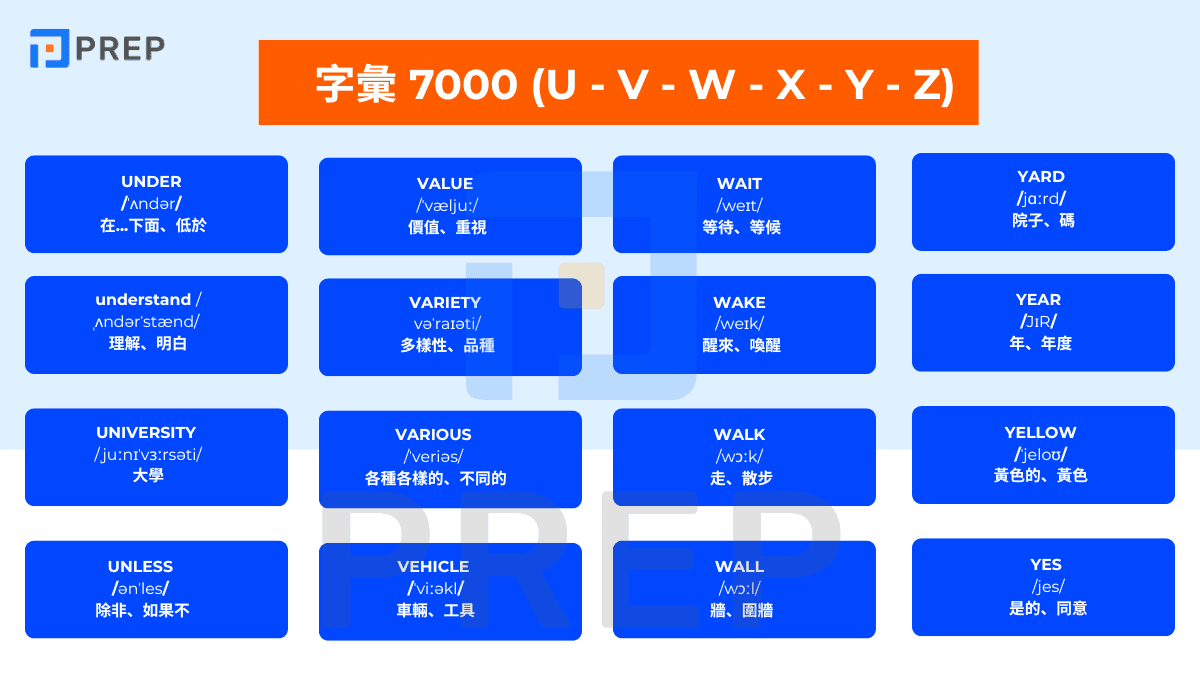
參考更多相關文章:
你也可以下載 PREP 在下方附上的 7000 個最常用英語單字檔案。這份資料將幫助你以科學的方法系統化並記憶 7000 個英語單字,非常適合英語初學者,以及正在準備 IELTS、TOEIC 或英語交流的人使用:
II. 3本不同取向的高口碑參考書
除了數位學習資源外,優質的實體書籍仍是深度學習英文單字 7000 的重要工具。以下三本書籍各有特色,適合不同學習風格和需求的讀者。
-
《英文單字 7000 魔法書》 以字根字首系統化教學為特色,將7000個單字按詞源分類,幫助讀者建立詞彙間的邏輯聯繫。本書附贈MP3光碟,由專業外籍錄音員朗讀,提供標準發音示範。特別適合喜歡系統性學習、注重理解脈絡的學習者。
-
《高中英文單字 7000 完全攻略》 強調大量練習和測驗,每單元都包含填空、選擇、翻譯等多種題型。書中提供豐富的搭配詞組合和實用例句,讓讀者在練習中自然掌握單字用法。最適合需要大量練習、準備考試的學生使用。
-
《英文 7000 單字口袋書》 採用輕便設計,重點整理高頻詞彙和核心用法。每個單字都標註重要度等級和使用頻率,讓讀者優先掌握最實用的詞彙。特別適合時間有限、需要隨時複習的上班族或學生。
這些實體書籍的優勢在於不受電子設備限制,可以隨時翻閱、做筆記標記。結合數位工具使用,能夠創造更全面的學習體驗,滿足不同感官的學習需求。

III. 结论
當您掌握英文 7000 單字後,如何判斷是否真正「精熟」一個單字?真正的精熟包含四個層面:認識(recognition)、理解(comprehension)、運用(production)和流暢(fluency)。您不僅要能認出單字並理解意思,更要能在適當情境中準確使用,並達到不假思索的自動化程度。
自我檢測標準包括:能否在3秒內說出單字的核心意義?能否舉出該單字的常見搭配詞組?能否在寫作或口說中自然使用?能否辨識該單字在不同語境中的細微差別?如果以上問題的答案都是肯定的,您才算真正精熟該單字。
掌握英文單字 7000 後的下一步學習路徑應該聚焦於:搭配詞學習(如make a decision, take responsibility)、片語動詞掌握(如look up, put off, get along with)、語域意識培養(正式vs非正式用法)以及文化內涵理解(如習語和諺語)。
最終目標是完成從「應試導向」到「應用導向」的轉變。英文單字 7000 只是您語言學習旅程的第一座里程碑,真正的挑戰和樂趣在於將這些詞彙轉化為流暢的溝通工具。持續學習、大量接觸真實語料、勇於實際應用,您將發現語言學習的無窮魅力,為人生開啟更廣闊的視野和機會。記住,語言是活的工具,只有在使用中才能展現其真正價值,讓我們一起踏上這段充滿挑戰與收穫的英語精進之路。
擔心對雅思或多益考試格式不熟悉嗎?勿讓陌生環境在關鍵時刻影響您的表現。PREPEDU Test Practice 打造完全仿真的考試情境,讓您在正式應考前充分適應各類題型與時間限制。
系統內建超過 1000 題動態更新的練習內容,緊密追蹤考試最新動向,確保您掌握熱門考點。進階 AI 引擎逐一檢視答題盲點,針對性提供改進方案,加速能力提升。
最令人驚豔的是實時進度視覺化追蹤,讓每次練習的成長軌跡一目了然。機會稍縱即逝,別錯過領先群雄的黃金時機——馬上體驗 PREP Test Practice,帶著十足把握走進考場!
立即免費試用 PREP 的雅思線上測驗與多益線上測驗免費!

你好!我叫黃秋賢,目前在網站 prepedu.com 的部落格擔任產品內容經理。
憑藉超過5年自學英語、漢語等外語以及準備一些雅思和托業考試的經驗,我積累了豐富的經驗,為數千名在學習外語方面遇到困難的人提供支持。希望以上分享能對大家在家有效自學的過程有幫助!
評論











